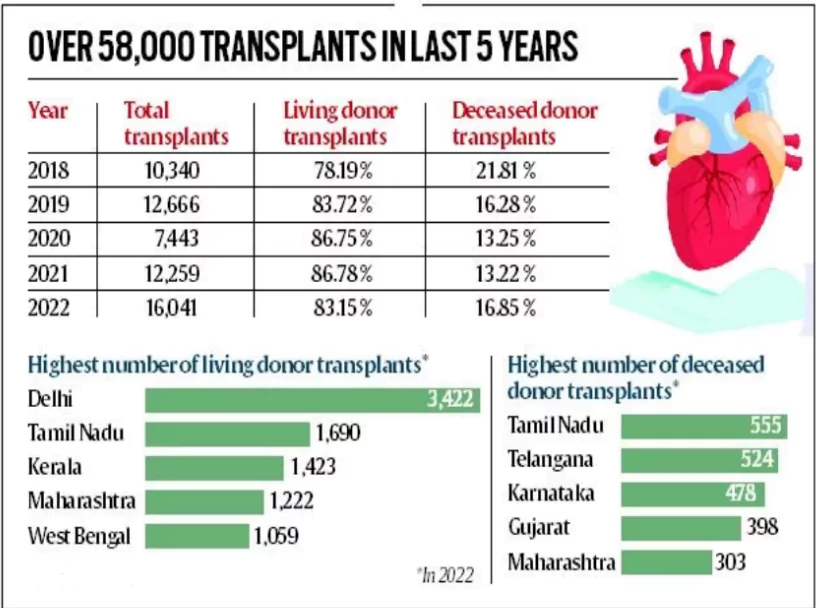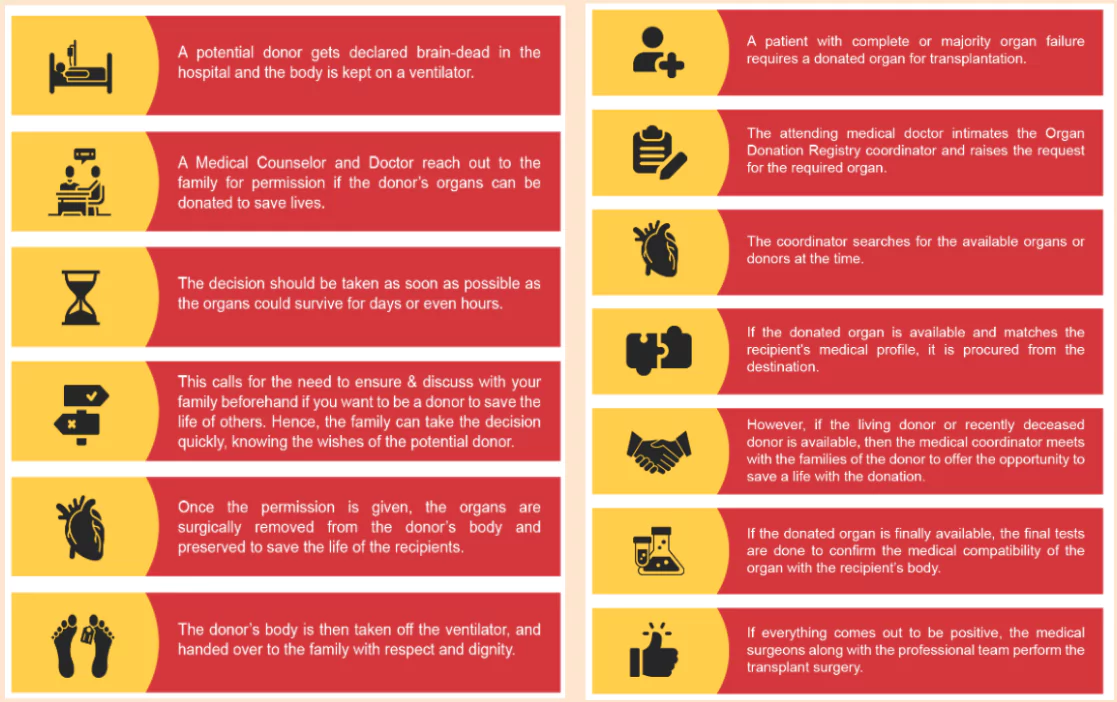The Union Health Ministry has warned states and institutions for functioning without regular transplant coordinators, a critical role under the National Organ Transplant Programme (NOTP).
- NOTP has provision for two transplant coordinators for government medical colleges and one for well-performing private medical colleges.
National Organ Transplant Programme scheme
- The National Organ Transplant Programme (NOTP) is aimed at improving access to life-saving organ transplants for needy citizens.
- The current phase of the scheme covers the period from 2020-21 to 2025-26.
- Key objectives of the NOTP:
- Promote deceased organ donation
- Improve access to transplantation for needy citizens
- Bridge the gap between availability and demand for organs and tissues
- Enhance organ donation rates in India
Enroll now for UPSC Online Classes
Strategies and activities under the NOTP
- Awareness campaigns: Conduct public awareness campaigns to educate people about organ donation and dispel myths and misconceptions.
- Training and capacity building: Train healthcare professionals in organ donation and transplantation procedures.
- Establishment of infrastructure: Develop a network of organ procurement and transplantation organisations (OPTOs) across the country.
- Financial assistance: Provide financial support to needy transplant recipients and deceased donors.
- Coordination and collaboration: Collaborate with various stakeholders, including government departments, NGOs, and medical institutions, to promote organ donation and transplantation.
Achievements of the NOTP
- Increase in organ donation rates: The organ donation rate in India has increased significantly since the launch of the NOTP.
- Establishment of OPTOs: A network of OPTOs has been established across the country, facilitating organ procurement and transplantation.
- Improved access to transplantation: More patients have been able to receive life-saving organ transplants due to the NOTP.
Organ Transplantation Data in India (2023)

- Global Context: India ranks third globally in total annual organ transplants, after the USA and China.
- Predominantly Living Donor-Based System:
- Kidney and liver transplants are largely carried out with living donors.
- Less frequent transplants: Heart, lung, pancreas, and small bowel.
- Highest Organ Transplants : Of the total 18,378 organ transplants in the country in 2023, 10% were to foreign nationals who had come to India for treatment.
- Donors: 63% living donors were women while 77% of deceased donors were men
- Recipients: 30% were women (Proportion being the highest among lung recipients at 47%)
- India achieved another milestone in 2023:More than 1,000 deceased organ donors in a year for the first time.
About Organ Transplantation
- Transplantation: It involves surgically removing an organ, tissue, or group of cells from a donor and transplanting it into the recipient, or relocating it within the same individual.
- Steps Involved in Organ Transplantation:

|
Eligibility for Organ Donation in India
- Living Donors: Living donors must be at least 18 years old, have no infectious diseases, active cancer, or severe infection, and are typically restricted to donating to immediate blood relatives.
- In special cases, donations can also be made out of affection and attachment for the recipient.
- Living donors are eligible to donate the following organs:
- One of their kidneys
- A portion of the pancreas
- Part of the liver
- Deceased Donors: They have an opportunity to donate six vital organs: kidneys, liver, heart, lungs, pancreas, and intestine.
- While uterus transplants are performed, they are not classified as life-saving organs.
- Consent from the family is required for organ donation from a person declared legally dead.
- 2023 Revised Guidelines for Organ Donation:
- Upper age limit of 65 years for receiving deceased donor organs was removed.
- The domicile requirement for registering patients for deceased donor transplants was removed to increase accessibility.
Check Out UPSC NCERT Textbooks From PW Store
Legislation Governing Organ Transplantation in India
- Transplantation of Human Organs and Tissues Act (THOTA): It was enacted in 1994 and amended in 2011, establishes the legal framework for organ transplantation in India.
- This law governs multiple facets of organ donation and transplantation, including the recognition of brain death as a form of death and the necessity of family consent for organ donation following brain death.
Organ Transplant Governance
- The National Organ & Tissue Transplantation Organization (NOTTO), located in New Delhi, coordinates procurement and distribution of organs nationwide.
- Five Regional Organ and Tissue Transplant Organizations (ROTTOs) and 14 State Organ and Tissue Transplant Organizations (SOTTOs) have been established under NOTP.
- National Network division of NOTTO: It function as apex center for all India activities of coordination and networking for:
- Procurement and distribution of organs and tissues.
- Registry of Organs and Tissues Donation and Transplantation in the country.
![]() 16 Oct 2024
16 Oct 2024

